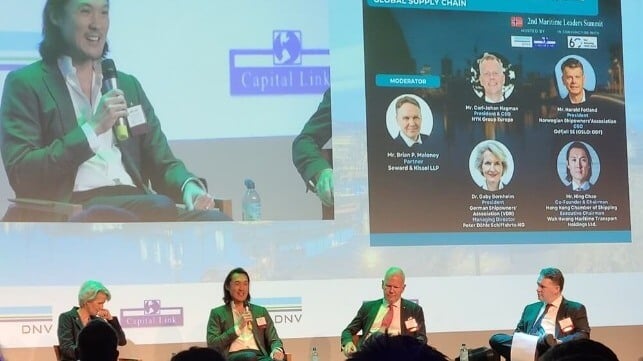At Nor-Shipping, U.S. Commercial Ties Outweigh U.S. Tariffs

At Nor-Shipping 2025, delegates from Scandinavia and Europe were quick to mention the uncertainty created by the Trump administration's on-again, off-again trade war - and many were just as quick to express an interest in keeping their heads down as Washington and Beijing exchange rhetorical fire. Most players - OEMs, shipowners, service providers - said that they have come to treat U.S. trade policy as a manageable disruption, no different than COVID or the Red Sea crisis. Transatlantic ties remain strong (as seen at a well-attended launch celebration for Norway's first branch of the Propeller Club, an international shipping association with proudly American roots).
"The history of shipping for 300, 400 years [has been] about dealing with change. And I think the industry has been extraordinarily resilient in managing these shifts. So I think even though we struggle now, we've always been struggling," NYK Europe chief Carl-Johan Hagman said in a panel interview, echoing a common sentiment. "Yes, we are concerned. On the other hand, shipping does not stop."
Some executives predicted that the White House will likely soften its most dramatic tariff and fee proposals. "The regulatory changes that we have seen so far on import tariffs and on the USTR port fees show that the U.S. doesn't want to do self-harm," said the CEO of one prominent Scandinavian shipowner, speaking on the conference's sidelines. "It doesn't seem that it will substantially change the trade flows in either the tanker or the dry bulk markets. Maybe more for container ships and car carriers."
The only sharp objection to U.S. trade policy heard publicly last week came from a Chinese shipowner, Hing Chao, executive chairman of Wah Kwong Maritime Transport and chairman of the Hong Kong Chamber of Shipping.
"From a Hong Kong and Chinese perspective, first of all, the [USTR port fees] are discriminatory. There is no reason why Chinese shipping and Chinese shipowners in particular should be targeted in that manner," said Hing at the Capital Link shipowners' panel. "We feel very much victimized by this U.S. policy. It is targeted, it is discriminatory, it is unfair and it is against the spirit of free trade."
While European owners and service providers were far quieter on the subject of U.S. trade policy, at least half a dozen voiced skepticism about America's hopes for a domestic shipbuilding revival. Many pointed to the challenge of building a heavy industry in an advanced economy with a skilled labor shortage - a challenge seen in the U.S. defense shipbuilding sector, but also in Korea and Japan. While this skeptical view would not be welcomed with open arms in American shipping circles, it was common in Oslo.
"If you throw enough money at [U.S. shipbuilding], you can make it happen, but I think the U.S. will be very careful how it spends its tax dollars. I think there will be some financing schemes, but outright heavy subsidies - which I think would be required to make it a big thrust - I don't think that's happening," one European energy shipping executive said. "India is next [as a shipbuilding powerhouse], they have the people to join the workforce."
The opinions expressed herein are the author's and not necessarily those of The Maritime Executive.
